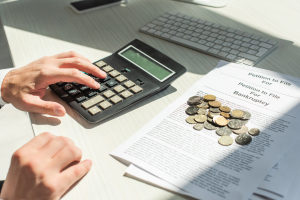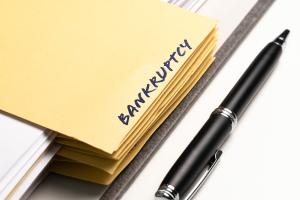
Are you feeling stressed out about the IRS tax debt? Have you considered discharging that tax debt in bankruptcy? Did you know that was even possible? Keep reading to learn the facts about discharging tax debt in bankruptcy.
Before making a major financial decision like filing for bankruptcy, make sure you speak with an experienced bankruptcy lawyer who can explain how the bankruptcy system works and will help you navigate your way to a debt-free fresh start.
If you have tax debts and cannot repay them, declaring bankruptcy may be an option. But does bankruptcy clear tax debt? Tax debt can be discharged in bankruptcy, but only under certain circumstances. If your tax debt is at least 3 years old and stems from a 1040 income tax return you filed with the IRS at least 2 years before filing bankruptcy, it may be discharged in bankruptcy.
As long as no fraud or misconduct led up to the tax debt assessment, you should be able to utilize bankruptcy to discharge and free yourself of the tax burden. Even non-dischargeable tax debt can be restructured in Ch. 13 bankruptcy.
Because bankruptcy has long-term financial and legal consequences, the US Bankruptcy Court strongly advises seeking the advice of a qualified attorney, even though it is possible to file for bankruptcy without one.
If you find yourself in a situation where paying off your tax debts may be impossible, enlisting the assistance of an experienced tax debt attorney can help you get back on track financially.

Considering bankruptcy filing, you may wonder what personal bankruptcies are available. First, it's important to note that there are two types of personal bankruptcy: liquidation bankruptcy and reorganization bankruptcy.
Chapter 7 bankruptcy, also known as the liquidation or straight bankruptcy. It is a process in which you can ask a bankruptcy court to discharge most of your debts and begin again. A judge will hear your case and decide whether or not to grant your request.
If the petition is approved, the court imposes an "automatic temporary stay," which prevents creditors from attempting to collect payments or taking actions such as wage garnishment, repossession, or foreclosure while the bankruptcy case is pending.
People in serious debt can file for Chapter 7 bankruptcy immediately, but some drawbacks exist.
Filing bankruptcy negatively impacts your credit score, and you may lose certain nonexempt assets that are sold or "liquidated" to repay your creditors. Most assets, however, are exempt and are not subject to liquidation.
The liquidation procedure generally consists of three steps:
Remember that student loans, tax debt, and other types of secured debt are not "dischargeable," You must repay them unless you demonstrate extraordinary circumstances. However, most consumer debt, such as medical bills and credit card debt, is dischargeable.
A Chapter 13 bankruptcy is a reorganization bankruptcy. It contrasts with Chapter 7 bankruptcy or liquidation bankruptcy.
In a Chapter 7 bankruptcy, you must surrender any nonexempt property in exchange for the majority of your debts being discharged.
Unlike the liquidation process, you will not be required to surrender any property during a Chapter 13 bankruptcy. Instead, it would help if you create a structured repayment plan outlining how you intend to use your income to pay off your debts for three to five years.
Whether you're thinking about filing for bankruptcy or are already in the process, there is one thing you want to be sure of. Ask yourself if you have secured or unsecured debt.
Read on to learn the difference between secured and unsecured debt during bankruptcy.
Secured Debt in Bankruptcy
This obligation is secured by so-called "collateral." The debt contract grants the lender a "lien" on the collateral or ownership interest. The lien will remain in effect until the loan gets repaid. The lien rights allow the lender to recover the property if the borrower defaults.
The following are some examples of secured debt.
Unsecured Debt in Bankruptcy
These debts are not collateralized. Unsecured debt includes credit card balances, medical bills, personal loans, utility balances, gym memberships, and other similar items.
The creditor cannot recover the purchased product or service if you do not pay. Instead, the creditor must go to court to determine the amount owed. A judgment creditor, or someone who has won a collection lawsuit, can use the judgment to garnish wages, seize property, and levy bank accounts.
Whether your debt gets discharged or a creditor gets paid determines whether it will be classified as a priority or nonpriority unsecured debt.

The type of tax, the age of the tax debt, whether you filed a return, and the type of bankruptcy all influence whether you can discharge tax debt. If you meet all of the following conditions, your federal income taxes in Chapter 7 are dischargeable:
Even if you meet these requirements, filing a tax lien by the IRS can complicate the situation. If you owe the IRS a significant amount of money that could be discharged in bankruptcy, you should file your bankruptcy case as soon as possible to avoid having the IRS file a tax lien against you.
A tax lien is a legal claim against your property, whereas a tax debt is a money owed to the taxing authorities. The lien can be placed on your assets, including bank accounts, personal belongings, vehicles, and real estate.
Whether and to what extent a tax lien is discharged in bankruptcy depends in part on the assets you have when filing the bankruptcy case. The tax lien creates a security interest in your assets and belongings. That turns all of your property into collateral for the tax lien.
However, if your property is limited to exempt items or of nominal value, the tax debt discharge will effectively discharge the tax lien along with it. If you have significant nonexempt assets, the lien will remain and survive the bankruptcy to the extent of the value of the unexempt collateral.
In any event, once you file for bankruptcy, the IRS cannot continue to try to collect on a dischargeable tax debt, even if a lien is in place. Your bank account or wages cannot be tapped to collect on the tax debt. You can continue to live in a house with a tax lien. However, the tax lien must be paid off at closing if you sell or refinance your home.

An experienced bankruptcy lawyer will tell you that in bankruptcy, timing is everything. However, with very rare exceptions, there is no benefit to delaying the filing of your returns. Even if you know there will be a significant tax debt owed, the sooner you file the return, the sooner it can be dischargeable. Before filing your bankruptcy case, you must have filed all required tax returns in the last 4 years.
Generally, some factors make it more crucial to keep your tax filings current if you consider declaring Chapter 7 or Chapter 13 bankruptcy.
When you learn that you'll need to file for bankruptcy, one of the first questions you might have is what will happen to your tax debt. Here's what happens to tax debt when you file for bankruptcy.
Your tax debt will be included if you file for Chapter 13 bankruptcy and the court trustee arranges a partial repayment plan. If it meets the five criteria outlined above, it is classified as a "nonpriority debt."
It means that it will be treated similarly to credit cards and other debts that are typically easy to discharge. Instead of repaying the entire amount, the court will determine how much you can repay. In your payment plan, you will repay some of the debt owed to you, the IRS, or your state tax office. The remaining balances will then be discharged.
If your tax debt does not meet those five criteria, it may classify as a "priority debt." You can still pay it off through your repayment plan. It must, however, be repaid in full.
One major difference between Chapter 13 and Chapter 7 regarding tax debt is that in Chapter 13, the IRS is required to file a "Proof of Claim" that itemizes all of the tax debt owed. In this Proof of Claim, the IRS will label the status of each itemized debt according to their computerized records. This is extremely helpful because it puts on record the exact amounts of tax debt that are and are not dischargeable in the bankruptcy case. This Proof of Claim is not filed in Chapter 7 cases, so there is not as much clarity as to the actual nature and dischargeability of the tax debt.
Chapter 7, also known as "liquidation bankruptcy," is less complicated. Your tax debt may get discharged if you meet the five criteria above. The discharge will also include any penalties and interest incurred due to the debt.
The tax debt and associated penalties will only be discharged if they meet those criteria. Although you still owe those taxes, you can still declare bankruptcy and have your other debts discharged.
Most people know that, unlike future filings, a tax refund due in the year they file for Chapter 7 bankruptcy becomes an asset of the "bankruptcy estate" and may be used to settle debts by a trustee.
The trustee can keep tax refunds each year of the prepayment plan under Chapter 13. It can only happen once in Chapter 7.
In a Chapter 7 filing, proper use of exemptions and timing of the bankruptcy filing petition can help you keep some of your tax refunds. It is best to seek professional assistance with tax refunds following the bankruptcy.

Filing bankruptcy is not a decision that should be taken lightly. Most people who consider bankruptcy have become overwhelmed by their financial situation and may even feel they have nowhere else to turn.
At Fleysher Law, we understand how difficult these moments can be. Our experienced bankruptcy lawyer ensures that you and your family fully understand this process's ramifications so there are no surprises.
We provide a safe place for you to discuss your options and decide how best to proceed before submitting your petition in court.
Call (888) 886-0020 now to schedule an initial consultation with our attorneys and discover the right strategy for dealing with your tax debt in bankruptcy!

"*" indicates required fields